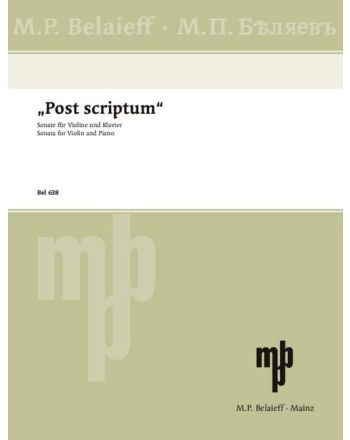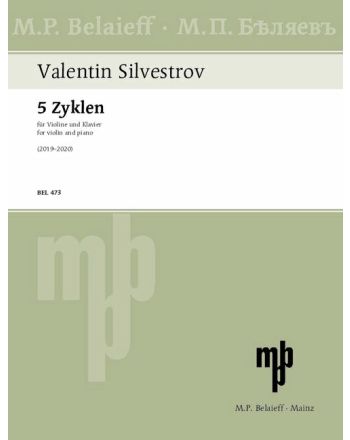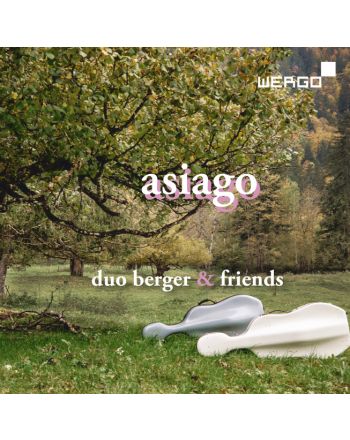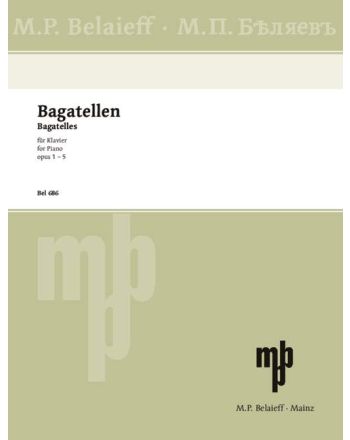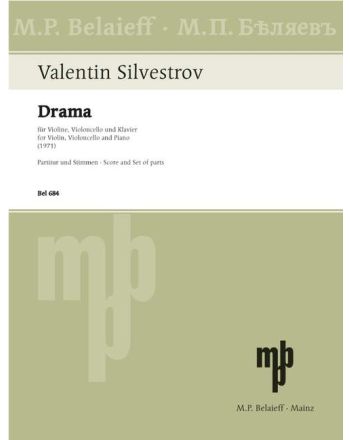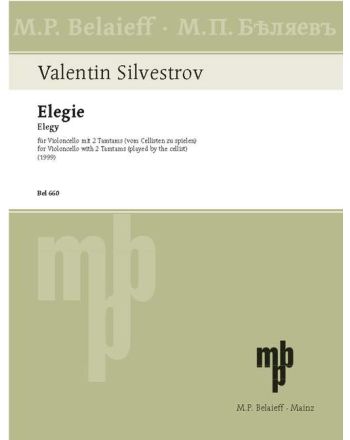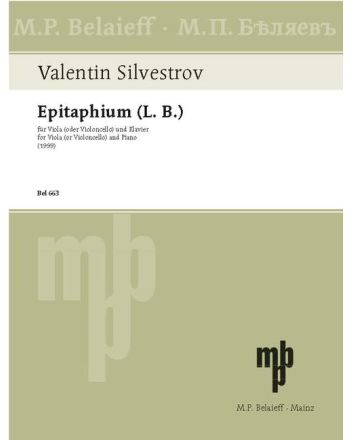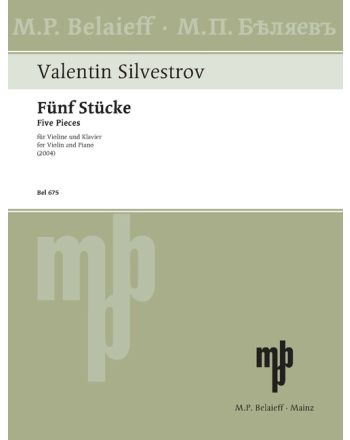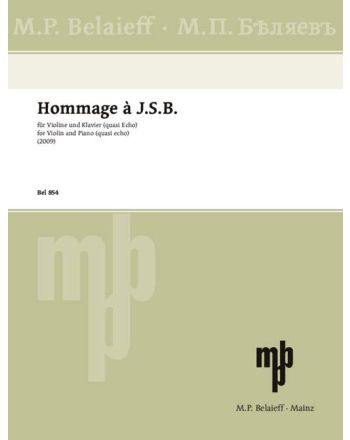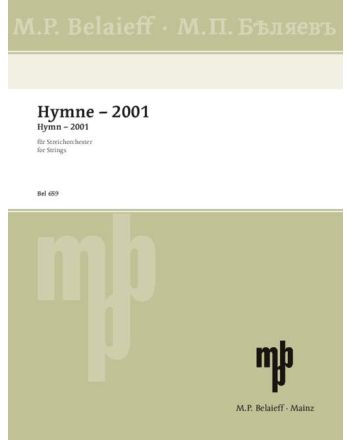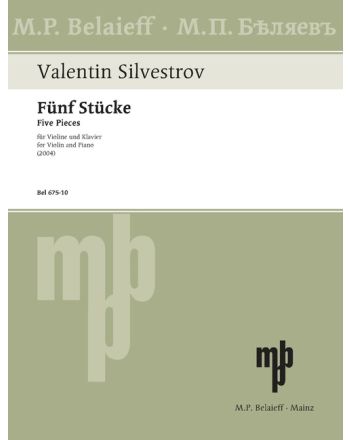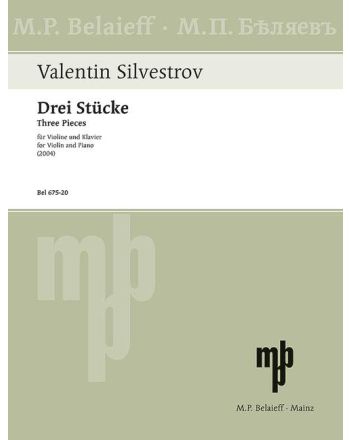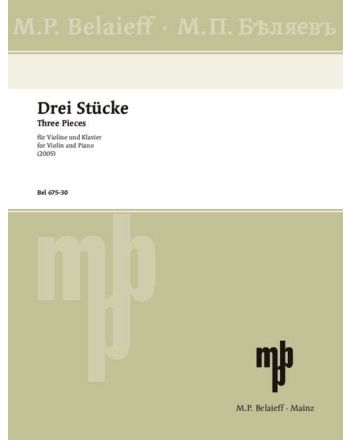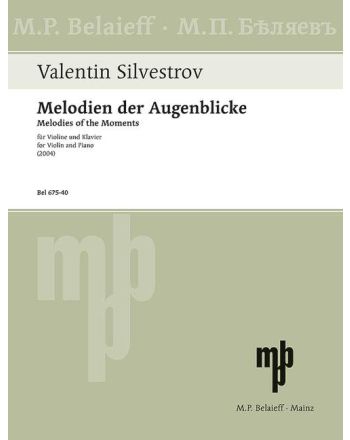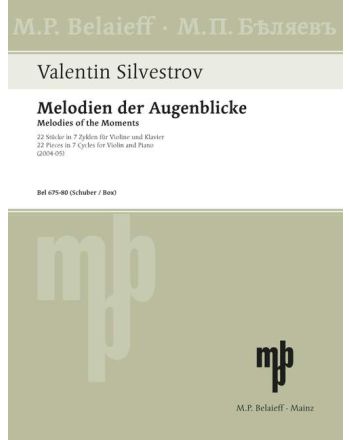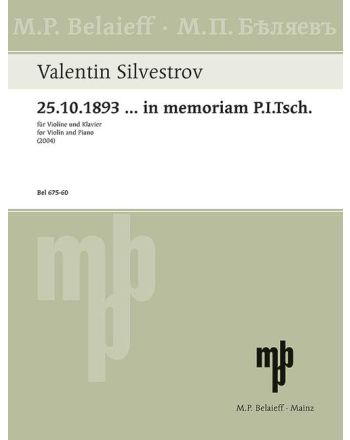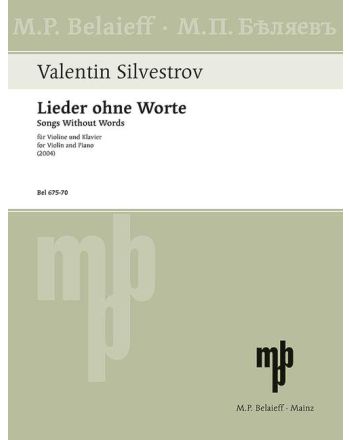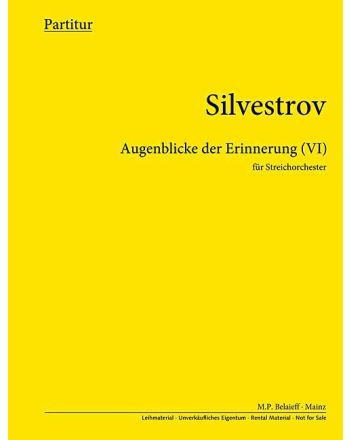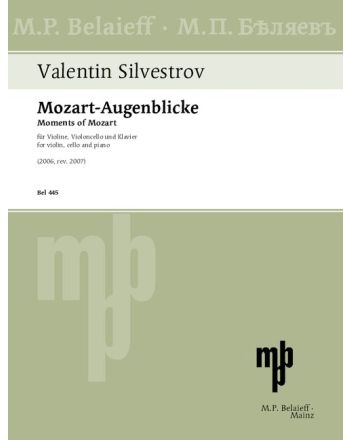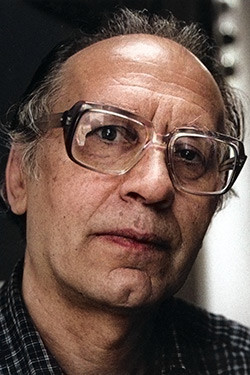
Valentin Silvestrov
Upcoming Performances
About Valentin Silvestrov
Music should be so transparent that one can see the bottom and that poetry shimmers through this transparency. (Valentin Silvestrov)
Valentin Silvestrov was born in Kiev on 30 September 1937. He came to music relatively late, at the age of fifteen. He at first taught himself, and then, between 1955-58, went to an evening music school while during the day studying to become a civil engineer; from 1958 to 1964 he studied composition and counterpoint, respectively, with Boris Lyatoshinsky and Lev Revutsky at Kiev Conservatory. He then taught at a music studio in Kiev for several years. He has been a freelance composer in Kiev from 1970 to 2022, fled from Ukraine in 2022 to Germany and currently lives in Berlin.
Silvestrov is considered one of the leading representatives of the "Kiev avant-garde", which came to public attention around 1960 and was violently criticized by the proponents of the conservative Soviet musical aesthetic. In the 1960s and 1970s his music was hardly played in his native city; premieres, if given at all, were heard only in Russia, primarily in Leningrad (now St. Petersburg), or in the West. His Spectrums for chamber orchestra, for example, was premiered to spectacular acclaim by the Leningrad Philharmonic under the baton of Igor Blashkov in 1965. In 1968 the same conductor gave the premiere of the Symphony no 2.
The works of the young composer, especially his Symphony no 3, were awarded the Koussevitzky Prize in 1967, and in 1970 Silvestrov’s Hymn for six orchestral groups received an honorary title at the international Gaudeamus competition and festival in Utrecht.
Despite much-acclaimed performances in the West, which the composer was not permitted to attend, his music was ignored in his own country on the official level, though unofficially it created quite a stir, which is the reason why it was sometimes banned. For many years there were at least a few enthusiastic performers who played his music from time to time.
This situation gradually changed with Silvestrov's growing international acclaim. One of his earliest champions was the American pianist and conductor Virko Baley, an aficionado and longtime advocate of contemporary Ukrainian music in general and Silvestrov's works in particular. It was Baley who brought about in 1985 the first performances of Postludium for piano and orchestra and in 1988 of the symphony for baritone and orchestra Exegi monumentum in Las Vegas as well as a Valentin Silvestrov 50th Birthday Concert in New York. Silvestrov became a visiting composer at the Almeida Music Festival in London (1989), Gidon Kremer's Lockenhaus Festival in Austria (1990), and various festivals in Denmark, Finland, and Holland. Later he was "composer in residence" in Hungary (2007 Pannohalma), Poland (2009 Nostalgia-Festival, Poznan), Austria (2013 Klangspuren, Schwaz), Switzerland (2016 Davos-Festival "Young artists in concert"), the Netherlands (2017 The Hague, Unheard Music Festival) and in Germany (2017/18 Staatskapelle Weimar).
Since the end of the 1980s, the number of performances has increased, even in Russia and the Ukraine. In 1989 Silvestrov took part in the "Alternativa" New Music Festival in Moscow, and in 1992 in the "Five Evenings with the Music of Valentin Silvestrov" in Ekaterinburg. In 1994 he participated in the "Sofia Gubaidulina and Her Friends" festival in St. Petersburg, and a year later in an event devoted to Sofia Gubaidulina, Arvo Pärt and himself. In 1998, on the occasion of his 60th birthday, there was a Silvestrov festival in Kiev with many concerts and a scholarly conference organized by the National Tchaikovsky Academy of Music of Ukraine, the former Kiev Conservatory.
During the 1990s, Silvestrov's music was heard throughout Europe as well as in Japan and the United States. In 1998-99, he was a visiting fellow of the DAAD (German Academic Exchange Service) in Berlin, where three of his major works have been premiered to date: Metamusic (March 1993), Dedication for violin and orchestra (November 1993), and Symphony no 6 (August 2002).
In celebration of Silvestrov’s 80th birthday there were many concerts across the world from America to Europe, to Russia, the Ukraine and to Japan: Gidon Kremer performed Dedication, Vladimir Jurowski was conducting Symphony no 3, Roman Kofman the Symphonies no 5 and 7, John Storgårds Symphony no 8; the world premiere of his Violin Concerto (2016) took place in Weimar on 14 January 2018 featuring the young violinist Valeriy Sokolov. Further renowned pianists, chamber musicians and choirs, as well as a conference in Moscow, joined the series of jubilee festivities.
Silvestrov has always maintained his independence, both in his early avant-garde period and after his stylistic volte-face in the 1970s. In recent decades he has dispensed with the conventional compositional devices of the avant-garde and discovered a style comparable to western "post-modernism". The name he has given to this style is "metamusic", a shortened form of "metaphorical Music".
Of all the many translations of the Greek prefix meta (after/post-, above/supra-, behind/ultra-, outside/extra-, etc.) Silvestrov prefers "above" or "behind". He regards metamusic as "a semantic overtone above Music". In a certain sense, "metamusic" stands for a universal style (a concept that Silvestrov has been using a long time) and a universal language. He understands it to mean "a general 'dictionary’ that belongs to no one but can be used by anyone in his or her own way."
His work has affinities with the era of the "classical" fin-de-siècle, especially Gustav Mahler, with whom Silvestrov is frequently compared. The difference is that the lexicon of contemporary musicians is unlimited. The lack of delimitation forces composers to search for the lost ontological meaning of music as art. Silvestrov believes that melody is an important precondition for the survival of Music – a view that reveals the lyric basis of his art regardless of the period in his career. The fact that he sees melody in a more comprehensive way is reflected in his vocal music which plays a special role in his musical output. Silvestrov is the author of two large and many shorter song cycles in addition to isolated songs and cantatas, most of them on poems by classical authors. His attitude to poetry is based on the notion that he does not wish to disturb its innate musicality and attempts to subordinate himself to it.
"Poetry ... is the salvation of all that is most essential, namely, melody as a holistic and indispensable organism. Either this organism is there, or it is not. I believe that Music – even if it cannot be 'sung' – is song nevertheless; it is neither philosophy nor a world view, it is the song of the world about itself, as it were a musical testimony to existence." This same approach also governs Silvestrov's instrumental music, which is always richly infused with both logical and melodic tension.
Since 2001/02, Silvestrov has again been working with small forms and "pure" melodies, composing numerous cycles ('families', 'colonies') for various small instrumentations (until 2021 more than 320 cycles for piano solo): waltzes, lullabies, postludes, nocturnes, barcaroles, pastorals, serenades. Silvestrov describes the short pieces as 'bagatelles' in the centre of which is the melody, and in which he tries to seize and 'halt' the 'melodic moment', intonations, calls and motifs which flash past, without imposing the burden of what is termed thematic elaboration.
Since 2005, Silvestrov has again increasingly devoted himself to choral music, particularly to sacred choral music which, however, is not intended for liturgical use.
During the political unrest in the Ukraine Silvestrov fought for his country with 'musical means', composing numerous choral works, 'Majdan Hymns' and 'Prayers for the Ukraine'.
During the pandemic-related lockdown, Silvestrov compiled numerous new super-cycles from his earlier "Bagatelles families" as well as from earlier vocal and instrumental compositions, including several "cantatas" for soprano, piano, harp and strings as well as a complex of "Songs without Words" - earlier songs in which violin or violoncello now take over the vocal part.
Due to the pandemic, the world premiere of his five-movement Symphony no 9 (2019) took place in July 2022 in Yerevan with the Armenian State Symphony Orchestra conducted by Sergey Smbatyan.
After Russia’s aggressive invasion of Ukraine, at the request of his family and with the help of friends, Silvestrov fled with his daughter and granddaughter to Berlin in March 2022, where he currently lives.
Worklist
Chronology
Flees Ukraine and lives in exile in Berlin, Germany
Cremona Music Award
OPUS Klassik Lifetime Achievement Award
Shostakovich Award of the International Shostakovich Days Gohrisch, Germany
Composer in residence: Lockenhaus (Germany, 1990), Staatskapelle Weimar (Germany, season 2017/18), Pannohalma (Hungary, 2007), Nostalgia Festiwal Poznán (Poland, 2009), Klangspuren Schwaz (Austria, 2013), Davos-Festival young artists in concert (Switzerland, 2016), Unheard Music Festival Den Haag (Netherland, 2017), Armenian State Symphony Orchestra (Yerevan, 2022-2023)
Silvestrov’s own division of his creative periods: 1960-1963 "dodecaphonic" period, 1964-1969 "avant-garde" period, 1970-1973 different stylistic systems depending on "essential unity", 1974-1989 "metaphorical style", since 1990 concept of a "meta music", search for a "universal style", since 2001/02 focus on small musical genres in various instrumentation, and choral music a cappella
Products
-
Composer: Valentin SilvestrovMedia Type: Sheet musicEdition: Performing scoreInstrumentation: clarinet solo (with a grand piano) 1 playerProduct number: BEL 604Print editionPrint editionIn stock€21.00Incl. Tax, Excl. Shipping
-
Sonata for violin and pianoComposer: Valentin SilvestrovEdition: Performing score, violin part includedProduct number: BEL 638Product TypeIn stockAs low as €15.99Incl. Tax
-
for violin and pianoProduct TypeIn stockAs low as €32.99Incl. Tax
-
for violin, piano and synthesizer (‘wind’)Composer: Valentin SilvestrovEdition: Score and partsInstrumentation: violin, piano and synthesizersProduct number: BEL 442Product TypeIn stockAs low as €26.99Incl. Tax
-
Duo Berger & FriendsComposer: Franghiz Ali-Zadeh | Giuseppe De Marzi | Lutz Dreyer | Zsolt Gárdonyi | Markus Schmitt | Valentin Silvestrov | Giovanni SollimaInterpreter: Franghiz Ali-Zadeh | Hyun-Jung Berger | Julius Berger | Stefan Blum | Alberto Brazzale | Ensemble CelloPassionato | Marlis NeumannOrchestra/ensemble: Southwest German Chamber Orchestra PforzheimConductor: Chungki MinMedia Type: CDProduct number: WER 74152CDCDIn stock€18.50Incl. Tax, Excl. Shipping
-
for soprano and chamber orchestraComposer: Valentin SilvestrovMedia Type: Hire/performance materialEdition: Performance materialLanguage: RussianHire/performance materialHire/performance material
-
Product TypeIn stockAs low as €19.99Incl. Tax
-
for soprano and chamber orchestraComposer: Valentin SilvestrovMedia Type: Hire/performance materialEdition: Performance materialLanguage: RussianHire/performance materialHire/performance material
-
for soprano, piano and string orchestraComposer: Valentin SilvestrovMedia Type: Hire/performance materialEdition: Performance materialInstrumentation: soprano, piano and string orchestraLanguage: UkrainianHire/performance materialHire/performance material
-
for soprano (or baritone) and chamber orchestraComposer: Valentin SilvestrovText writer: Taras SchewtschenkoMedia Type: Hire/performance materialEdition: Performance materialLanguage: UkrainianHire/performance materialHire/performance material
-
for piano and orchestraHire/performance materialHire/performance material
-
for violin and orchestraComposer: Valentin SilvestrovMedia Type: Hire/performance materialEdition: Performance materialInstrumentation: orchestraHire/performance materialHire/performance material
-
A collection of new pieces for pianoMedia Type: Sheet musicInstrumentation: pianoLanguage: EnglishProduct number: ED 21470Print editionPrint editionIn stock€10.00Incl. Tax, Excl. Shipping
-
symphony for violin and orchestraHire/performance materialHire/performance material
-
CantataComposer: Valentin SilvestrovEdition: Choral scoreInstrumentation: mixed chorus a cappella (SSAATTBB and Basso profundo)Product number: BEL 646Product TypeIn stockAs low as €9.99Incl. Tax
-
for violin, cello and pianoProduct TypeIn stockAs low as €56.99Incl. Tax
-
for cello with 2 tam-tam (played by the cellist)Composer: Valentin SilvestrovInstrumentation: cello and 2 tam-tams (played by the cellist)Product number: BEL 660Product TypeIn stockAs low as €13.99Incl. Tax
-
Ivan Karabits ... Valentin SilvestrovHire/performance materialHire/performance material
-
Composer: Valentin SilvestrovMedia Type: Sheet musicEdition: Choral scoreInstrumentation: large mixed chorus a cappellaLanguage: German, UkrainianProduct number: BEL 643Print editionPrint editionIn stock€18.50Incl. Tax, Excl. Shipping
-
for piano and string orchestraComposer: Valentin SilvestrovMedia Type: Hire/performance materialEdition: Performance materialInstrumentation: piano and string orchestraHire/performance materialHire/performance material
-
for piano and string orchestraHire/performance materialHire/performance material
-
Composer: Valentin SilvestrovMedia Type: Sheet musicEdition: ScoreSeries: Epitaph
Instrumentation: piano and string orchestraProduct number: BEL 654Print editionPrint editionIn stock€17.00Incl. Tax, Excl. Shipping -
Composer: Valentin SilvestrovSeries: Epitaph
Instrumentation: viola (cello) and pianoProduct number: BEL 663Product TypeIn stockAs low as €10.99Incl. Tax -
Symphony for baritone (or soprano) and orchestraComposer: Valentin SilvestrovMedia Type: Hire/performance materialEdition: Performance materialLanguage: RussianHire/performance materialHire/performance material
-
for string orchestraHire/performance materialHire/performance material
-
from 'Melodies of the Moments'Product TypeIn stockAs low as €21.99Incl. Tax
-
for piano and string orchestraHire/performance materialHire/performance material
-
for mixed choir a cappellaComposer: Valentin SilvestrovText writer: Taras SchewtschenkoEdition: Choral scoreInstrumentation: choir a cappella (at least 14-16 singers)Product number: BEL 490Product TypeIn stockAs low as €4.99Incl. Tax
-
for mixed choir a cappellaComposer: Valentin SilvestrovEdition: Choral scoreInstrumentation: mixed choir a cappellaProduct number: BEL 487Product TypeIn stockAs low as €4.99Incl. Tax
-
for violin and piano (quasi echo)Composer: Valentin SilvestrovEdition: Performing score, violin part includedProduct number: BEL 854Product TypeIn stockAs low as €7.99Incl. Tax
-
for strings, winds, piano, celesta, harp and bellsHire/performance materialHire/performance material
-
Composer: Valentin SilvestrovEdition: ScoreSeries: Hymne - 2001
Instrumentation: string orchestraProduct number: BEL 659Product TypeIn stockAs low as €13.99Incl. Tax -
for string orchestraHire/performance materialHire/performance material
-
for chamber orchestraHire/performance materialHire/performance material
-
for mixed choir a cappellaComposer: Valentin SilvestrovEdition: Choral scoreInstrumentation: mixed choir a cappellaProduct number: BEL 650Product TypeIn stockAs low as €10.99Incl. Tax
-
Symphony for violoncello and orchestraHire/performance materialHire/performance material
-
5 PiecesComposer: Valentin SilvestrovProduct number: BEL 675-10Product TypeIn stockAs low as €21.99Incl. Tax
-
3 PiecesComposer: Valentin SilvestrovProduct number: BEL 675-20Product TypeIn stockAs low as €13.99Incl. Tax
-
3 PiecesComposer: Valentin SilvestrovProduct number: BEL 675-30Product TypeIn stockAs low as €13.99Incl. Tax
-
3 PiecesComposer: Valentin SilvestrovProduct number: BEL 675-40Product TypeIn stockAs low as €13.99Incl. Tax
-
2 ElegiesComposer: Valentin SilvestrovProduct number: BEL 675-50Product TypeIn stockAs low as €9.99Incl. Tax
-
25-10-1893 … in memoriam P.I.Tch.Composer: Valentin SilvestrovProduct number: BEL 675-60Product TypeIn stockAs low as €14.99Incl. Tax
-
Songs without WordsComposer: Valentin SilvestrovProduct number: BEL 675-70Product TypeIn stockAs low as €11.99Incl. Tax
-
symphonic poem for orchestraHire/performance materialHire/performance material
-
Symphony for piano and orchestraHire/performance materialHire/performance material
-
Symphony for piano and orchestraComposer: Valentin SilvestrovMedia Type: Sheet musicEdition: ScoreSeries: Metamusik
Product number: BEL 543Print editionPrint editionIn stock€89.00Incl. Tax, Excl. Shipping -
7 movements attaccaComposer: Valentin SilvestrovMedia Type: Sheet musicEdition: Score and partsProduct number: BEL 545Print editionPrint editionOut of stock€46.00Incl. Tax, Excl. Shipping
-
for piano and string orchestraHire/performance materialHire/performance material
-
7 movements attaccaHire/performance materialHire/performance material
-
for violin, cello and pianoComposer: Valentin SilvestrovEdition: Score and partsInstrumentation: violin, cello and pianoProduct number: BEL 445Product TypeIn stockAs low as €24.99Incl. Tax


